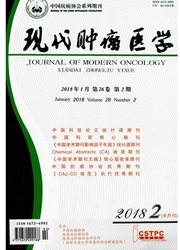

 中文摘要:
中文摘要:
目的:探讨MACC1(metastasis-associated in colon cancer l)基因特异性siRNA(small interfering RNA)对肺癌细胞系SBC-5体外增殖和迁移的影响。方法:化学合成MACC1基因特异性siRNA,阳离子脂质体LipofectamineTM 2000转染肺癌细胞系SBC-5细胞,RT-PCR和Western blot方法检测转染后SBC-5细胞中MACC1基因和蛋白的表达情况;MTT法检测细胞的生长增殖状况;划痕试验观察细胞迁移能力的改变。结果:MACC1基因特异性siRNA转染细胞后,SBC-5细胞MACC1的mRNA和蛋白表达水平明显降低,MTT试验和划痕试验观察到转染MACC1-siRNA的SBC-5细胞增殖、迁移能力明显减弱。结论:MACC1基因特异性siRNA可以明显抑制肺癌SBC-5细胞增殖和迁移,MACC1可能成为肺癌治疗的新靶点。
 英文摘要:
英文摘要:
Objective:To investigate the influence of siRNA targeting metastasis-associated in colon cancer l(MACC1) gene on proliferation and migration of human lung cancer cell line SBC-5 in vitro.Methods:The siRNA targeting MACC1 gene and negative control siRNA were chemically synthesized,and were then transiently transfected into human lung cancer cell line SBC-5 by LipofectamineTM 2000.Expression of MACC1 mRNA and protein in siRNA transfected cells were examined by RT-PCR and Western blotting analysis.Proliferation and migration of siRNA transfected SBC-5 cells were examined by MTT and Wound healing assay.Results:Transfection of specific siRNA targeting MACC1 into SBC-5 cells inhibited MACC1 gene expression and both mRNA and protein expression levels declined markedly.siRNA transfected SBC-5 cells showed decreased ability of proliferation and migration.Conclusion:The specific siRNA targeting MACC1 gene can significantly inhibit proliferation and migration of SBC-5 cells,MACC1 may serve as a potential target for gene therapy of lung cancer.
 同期刊论文项目
同期刊论文项目
 同项目期刊论文
同项目期刊论文
 Double strand RNA-guided endogeneous E-cadherin up-regulation induces the apoptosis and inhibits pro
Double strand RNA-guided endogeneous E-cadherin up-regulation induces the apoptosis and inhibits pro 期刊信息
期刊信息
